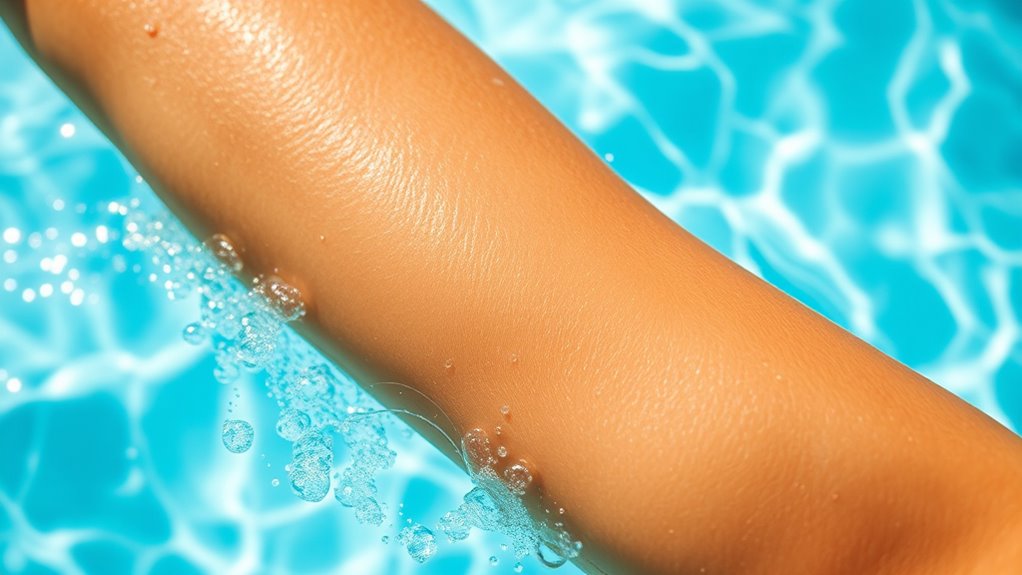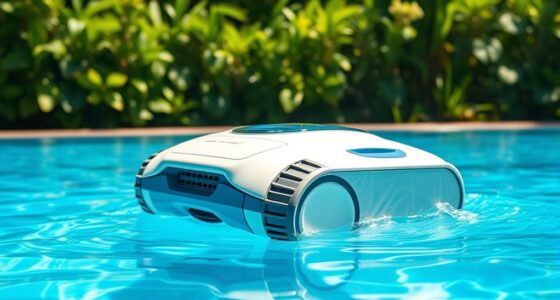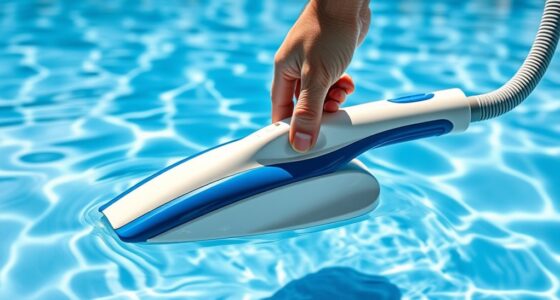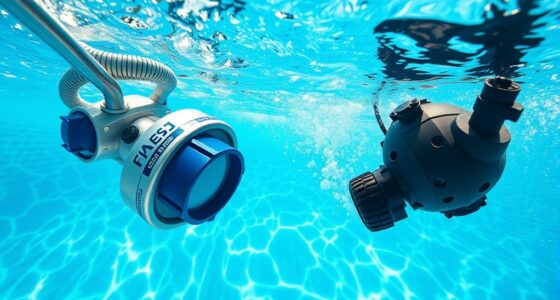Chlorine in pools can dry out your skin and cause irritation, which may fade your tan faster. When chlorine strips natural oils, your skin becomes tight, flaky, and more prone to damage, reducing your sun-kissed glow over time. Maintaining proper pH levels and moisturizing after swimming can help protect your skin and preserve your tan. To learn how to keep your skin healthy and glowing, explore further tips and tricks.
Key Takeaways
- Chlorine can dry out your skin, making it more prone to irritation and affecting your overall skin tone and tan appearance.
- Imbalanced pool pH levels can cause skin redness or irritation, disrupting your natural tan and skin health.
- Excessive chlorine exposure may strip natural oils, leading to dullness and uneven tanning results.
- Proper pool chemistry and post-swim skincare help maintain healthy skin and an even, radiant tan.
- Using moisturizing products after swimming can counteract chlorine’s drying effects and preserve your skin’s glow.

When you spend time swimming in a pool, it’s easy to overlook how pool chemicals can affect your skin. One of the most common concerns is skin dryness, which often results from exposure to chlorinated water. Chlorine, an essential chemical used to keep pools sanitized, can strip away your skin’s natural oils, leaving it feeling tight, flaky, and irritated. Over time, repeated exposure can lead to persistent dryness, making your skin more vulnerable to irritation and discomfort. This is especially true if you’re frequently in the water or don’t take protective measures afterward.
Spending time in pools can lead to skin dryness from chlorine exposure and disrupted pH balance.
Another essential factor influenced by pool chemicals is your skin’s pH balance. Pools are typically maintained at a pH level between 7.2 and 7.8 to ensure the water remains safe and comfortable for swimmers. When the pH balance skews too high or too low, it can upset your skin’s natural barrier. An imbalanced pH can make your skin more alkaline or acidic, which can exacerbate dryness and irritation. For instance, if the pH becomes too high, the water can feel harsh on your skin, stripping oils and disrupting the skin’s natural barrier. Conversely, if the pH drops too low, it can cause your skin to become overly acidic, leading to redness and irritation.
Maintaining proper pH balance in the pool isn’t just about water quality—it directly impacts how your skin reacts to swimming. When the pH is well-regulated, chlorine remains effective without excessively irritating your skin. However, when the pH is off, you may notice increased skin dryness or irritation after swimming. This imbalance forces your skin to work harder to restore its natural barrier, which can lead to discomfort and longer recovery times. Proper pool chemistry plays a crucial role in preventing skin issues and ensuring a comfortable swimming experience.
To protect your skin, you should consider showering immediately after swimming to wash away residual chlorine and chemicals. Applying a moisturizer afterward can help restore your skin’s moisture levels and combat dryness. Using gentle, pH-balanced skincare products can also support your skin’s natural barrier. If you notice persistent dryness or irritation, it might be worth checking the pool’s water chemistry or wearing protective gear like waterproof lotions or barrier creams.
Understanding how pool chemicals influence skin dryness and pH balance helps you take better care of your skin while enjoying the water. By being proactive—maintaining proper pool chemistry and caring for your skin—you can keep your tan looking healthy and radiant without sacrificing comfort or skin health.
Frequently Asked Questions
Can Chlorine Exposure Cause Long-Term Skin Damage?
Chlorine exposure can cause long-term skin damage if you’re not careful. It may lead to chlorine dermatitis, causing redness, irritation, and dryness. Over time, frequent exposure can accelerate skin aging, making your skin look dull and wrinkled. To protect yourself, limit your time in chlorinated pools, shower afterward, and moisturize. These steps help prevent damage and keep your skin healthy despite regular chlorine contact.
How Does Chlorine Affect Different Skin Types?
You might notice that chlorine affects your skin differently depending on your skin sensitivity. For sensitive skin, chlorine can cause irritation or dryness due to chemical reactions that strip natural oils. If your skin is less sensitive, you may experience fewer issues, but prolonged exposure still risks dryness or redness. Always rinse after swimming and moisturize to minimize these effects, regardless of your skin type.
Are There Safer Alternatives to Chlorine for Pools?
If you’re looking for safer pool options, consider saltwater systems and alternative disinfectants. Saltwater pools use a gentle chlorine generated naturally, reducing harsh chemical exposure. Other options include UV sterilization or ozone systems, which disinfect without chlorine‘s skin effects. These alternatives help protect your skin and provide a more comfortable swimming experience. Exploring these options can make your pool time healthier and more enjoyable without compromising safety or your tan.
Does Showering Immediately After Swimming Prevent Skin Issues?
Showering immediately after swimming can help maintain your skin pH balance and reduce irritation. It’s an essential part of your shower routine, as it rinses away chlorine and other chemicals that can cause dryness or inflammation. By doing so, you lower the risk of skin issues and keep your skin healthier. Just use lukewarm water and gentle soap to effectively remove residues without stripping your skin’s natural oils.
Can Skin Allergies From Pool Chemicals Develop Over Time?
You might wonder if skin allergies from pool chemicals can develop over time. Yes, allergic reactions and chemical sensitivity can build up gradually. Repeated exposure to chlorine and other chemicals can cause your skin to become more reactive, leading to itchiness, redness, or rashes. It’s important to monitor your skin’s responses and take precautions, like showering after swimming and using barrier creams, to reduce the risk of developing allergies.
Conclusion
Think of pool chemicals as the silent artists shaping your tan’s fate. While they keep the water sparkling and safe, they can quietly fade your glow, like a sunset swallowed by clouds. To keep your skin radiant, rinse well after swimming and moisturize like tending a delicate garden. Remember, your tan’s story isn’t just written in the sun but also in how you treat your skin behind the scenes. Protect it, and let your glow shine through.









